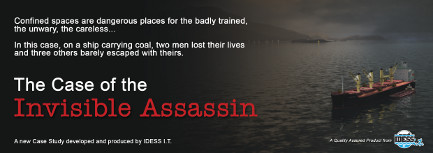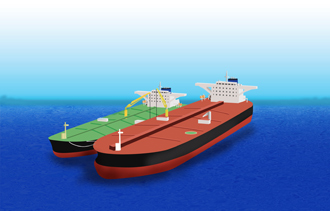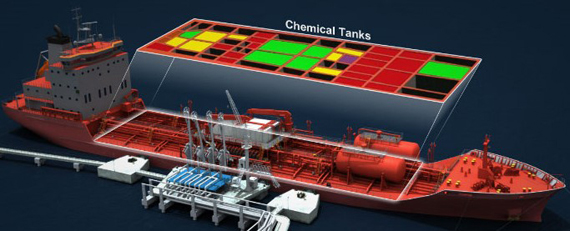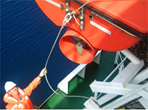| Home > Loss Prevention > Education & Training Tools |
The Club's e-Learning tools are specifically designed to be "user friendly" for seafarers and office personnel on relevant safety and environmental protection related topics. All modules are accessible wherever there is a connection to the Internet, or through the shipboard Plug and Play system, thus making it easy and convenient for seafarers to study the subject matter before they join their ships. The system also includes a secure online testing facility.
Members can track their seafarers' knowledge and keep up-to-date records of familiarization training in compliance with the STCW Convention, environmental regulations and the company's safety management system requirements under the ISM Code.
All e-Learning tools and aids are free of charge to Club Members and available in English, new and traditional Mandarin languages and can be accesssed by Club Members, free of charge.
The Club's e-Learning tools were developed in cooperation with IDESS Interactive Technologies (IDESS IT) Inc. in Subic Bay, Philippines. For non-Members, these tools are available for purchase from IDESS IT, Inc. via their website at https://www.idess-it.com/
Members must fill out the Club Member Registration form.
For newly registered members and members who are using the Plug & Play (PnP) hard drive:
- Go to https://secure42.idessonline.com/americanclub/newsealearn/
- Click the link "Click here to register"
- Fill out the Club Member Registration Form then click the Submit button.
The Member will be notified via email once their Super Administrator account is activated.

Stranger on the Bridge is aimed at enhancing the awareness of seafarers on bridge resource management while a pilot is aboard ship. The case studies focus on the responsibilities of deck crew, and the limitations of over-reliance on marine pilotage, in preventing accidents. It comprises three case studies which highlight the challenges in ensuring proper command and communication between pilot and crew. This tool is available to Members in three languages, English, Chinese and Russian.
The program is also available in a DVD format which can be shipped to Members upon request.

Clean Seas: Complying with MARPOL 73/78 have developed a series of web-based e-learning modules designed to familiarize seafarers with the six annexes to the MARPOL Convention as follows:
- Annex I – oil pollution;
- Annex II – noxious liquid substances carried in bulk;
- Annex III – harmful substances carried in packaged form;
- Annex IV – garbage;
- Annex V – sewage; and
- Annex VI – air pollution.
Clean Seas: Complying with MARPOL 73/78 was developed, in part, as a response to the pervasive concerns of the international community as to the protection of the marine environment. Although claims in regard to environmental damage have reduced in frequency in recent years, the cost of individual claims has not diminished. Moreover, the potential for owners and their crews to be subject to criminal and civil suits has also increased in many jurisdictions around the world.
 We reiterate that seafarers and shipowners alike need to be diligently aware of the tragic circumstances surrounding deaths occurring on board ship as a result of entry into enclosed spaces and to reinforce the awareness about this deadly hazard. There are two case study modules related to the potentially fatal hazards associated with entry into enclosed spaces onboard ship.
We reiterate that seafarers and shipowners alike need to be diligently aware of the tragic circumstances surrounding deaths occurring on board ship as a result of entry into enclosed spaces and to reinforce the awareness about this deadly hazard. There are two case study modules related to the potentially fatal hazards associated with entry into enclosed spaces onboard ship.
The first is The Case of the Silent Assassin which highlights the dangers of entry into enclosed spaces onboard tank ships. The second case is The Case of the Invisible Assassin, which highlights on the dangers associated with this entry into enclosed spaces onboard bulk carriers.

The aim of the e-learning module on the International Maritime Solid Bulk Cargoes (IMSBC) Code, is to introduce the details of this mandatory Code that promotes the safe carriage of solid bulk cargoes. Particular attention is paid to company and shipboard compliance with the Code for cargoes that may liquefy or possess a chemical hazard that could give rise to a dangerous situation on a ship.
The module covers compliance with the Code of Practice for the Safe Loading and Unloading of Bulk Carriers (BLU Code). Its aim is to familiarize Members and their crew with the Code's requirements in regard to bulk carriers, terminal operators and other parties concerned with the safe handling, loading and unloading of solid bulk cargoes. The contents of the module are also linked to regulation VI/7 of the 1974 SOLAS Convention, as amended by resolution MSC.47(66).
This module focuses upon compliance with the mandatory provisions of the International Maritime Organization’s International Code for the Safe Carriage of Grain in Bulk. The aim of the e-learning module is to familiarize Members and their seafarers of the requirements including stability requirements, stowage, divisional loading, strapping and lashing and all other provisions under the Code.
This module addresses the methods of stowing and securing timber cargoes on deck that withstand heavy weather. The TDC Code is aimed at ensuring that the stowage and cargo securing arrangements for timber deck cargoes through a safe yet rational securing of the cargo that satisfactorily prevents shifting by collapsing, sliding or tipping in any direction, taking into account the acceleration forces the cargo may be subjected to throughout the voyage in the worst sea and weather conditions which may be expected.
This module provides a summary of the COLREGS that set forth the "rules of the road" or navigation rules to be followed by ships and other vessels at sea to prevent collisions between two or more vessels.

Ship-to-ship (STS) cargo transfer operations are significantly more complex and well-known to pose a higher set of safety and environmental based risk factors than a single vessel cargo operation. This module provides guidance based on industry best practices in STS operations focused upon ensuring safety and environmental protection.
Chemical Tank is a comprehensive e-Learning module addressing the competency and knowledge training requirements as set forth in the 2010 STCW Code, Table A-V/1-1-3, Specification of minimum standard of competence in advanced training for chemical tanker cargo operations module.


This module focuses upon drills, training and best practice procedures including tricing pennants, bowsing tackle, launching into burning seas and fall prevention devices for twin fall Totally Enclosed Motor Propelled Survival Crafts (TEMPSCs).
